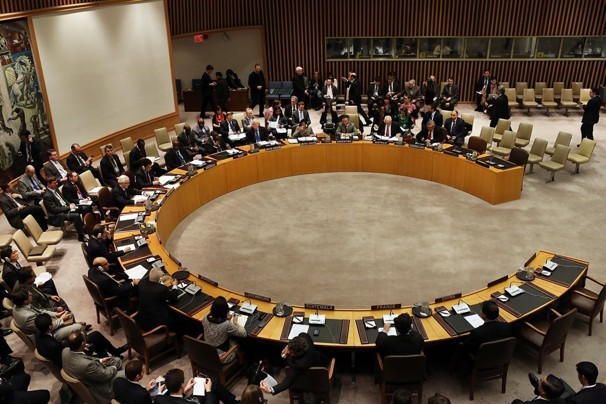The views expressed in our content reflect individual perspectives and do not represent the authoritative views of the Baha'i Faith.
Even in the most closely-knit families, family members will inevitably disagree, sometimes intensely. Does this sound familiar?
Healthy, mature families find ways of managing and resolving their disputes amicably. Dysfunctional families allow disputes to engender long-term resentment, bitterness, anger and even revenge or outright violent conflict. If we accept the maturation analogy offered in the Baha’i writings that humanity, like an individual, grows and matures gradually, it stands to reason that the world’s nations can also find increasingly mature ways to resolve their inevitable disagreements and disputes peaceably, without resorting to force.
In the aftermath of the First World War, the community of nations created an International Tribunal as an agency of the League of Nations, in the hopes that nations would turn to it to resolve their disputes instead of fighting destructive wars and shedding unnecessary blood. They hoped that the Tribunal would thereby maintain peace in the world. When both the Tribunal and the League of Nations failed, and the world suffered the horrors of a Second World War, the community of nations picked itself up and tried again, creating the United Nations and a World Court to support it. Unfortunately, however, the Court’s creation contained certain fatal flaws in its make-up that continue to hamper its ability to maintain peace.
For example: when a nation breaks international laws or otherwise becomes embroiled in serious disputes with another nation, it has the power to decide whether it wants to submit to the jurisdiction of the World Court or not. Even if that nation agrees to accept the jurisdiction of the World Court, the Court has no way of enforcing its final judgment, and must rely on the good will of the aggressor to voluntarily abide by the Court’s decision. No wonder, then, that the Court has failed in its purpose to avoid conflicts and wars and assure world peace.
We would never stand for such a system in our home countries or localities. Imagine the following: a man commits murder in your community, but gets to choose whether or not he wishes to submit to the jurisdiction of the local court to have his case tried. Imagine further that having acquiesced to trial by such a court, the accused is found guilty–and now learns that the judge assumes he will voluntarily abide by the verdict. The judge then tells him to walk himself over to the prison and ask the guards to incarcerate him. Such scenarios seem ludicrous, don’t they? And yet, this exactly describes the kind of system we currently have in place to serve us as a world community of nations.
The Baha’i writings recognize that we need to create a much-improved and more effective International Court that can adequately cater to the needs of a maturing world community, effectively prevent war and ensure peace:
All disputes of an international character shall be submitted to this Court, its work being to arrange by arbitration everything which otherwise would be a cause of war. The mission of this Tribunal would be to prevent war. – Abdu’l-Baha, Paris Talks, p. 155.
The Baha’i teachings envision an International Court that would have compulsory jurisdiction over all disputes that arise between nations, regardless of whether they wish it or not. This means that nations who break international law do not get to shirk responsibility and get away with murder, whether literally or figuratively, by deciding that they don’t want to show up in Court. The Baha’i writings further recommend that any judgment issued by the Court will be binding upon all parties to the case. Should a nation fail to abide by the Court’s decision, it can be enforced through the coercive powers of an International Executive and a standing army:
To remedy this condition there must be universal peace. To bring this about, a Supreme Tribunal must be established, representative of all governments and peoples; questions both national and international must be referred thereto, and all must carry out the decrees of this Tribunal. Should any government or people disobey, let the whole world arise against that government or people. – Abdu’l-Baha, Selections From the Writings of Abdu’l-Baha, p. 249.
The Baha’i teachings further propose that the members of this new World Court be elected in a way that ensures they truly represent the citizens of the entire global community they serve:
A Supreme Tribunal shall be established by the peoples and Governments of every nation, composed of members elected from each country and Government. The members of this Great Council shall assemble in unity. – Abdu’l-Baha, Paris Talks, p. 155.
If we follow this guidance, the global community will be far more likely to trust a democratically-elected World Court to act in its collective best interests.
This system of representative election looks very different from the system in place today, in which judges of the World Court secure appointments from their countries in back room deals heavily influenced by political considerations, rather than having the collective interests of humanity as the driving motive in their selection. Indeed, studies have shown that existing World Court judges often exercise bias in favor of their own countries when deciding cases. As a result, the decisions of the Court do not always represent humanity’s unalloyed interests of peace and justice.
These recommended changes, put forward by the Baha’i teachings more than a century ago, would revitalize and renew the world’s hopes for a lasting, secure and peaceful future.

















Comments
Sign in or create an account
Continue with Googleor